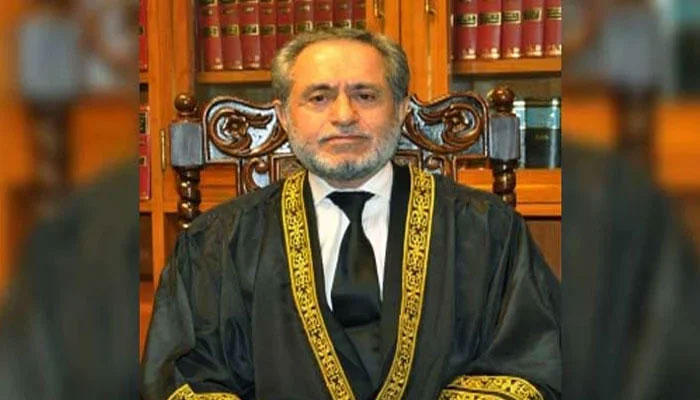How can civilian be tried in military courts, asks SC judge
Justice Mandokhail asked Khwaja Haris whether F B Ali was granted fundamental rights
ISLAMABAD: Supreme Court judge Jamal Khan Mandokhail Tuesday remarked how in the context of F B Ali case, civilians accused can be tried in military courts.
A seven-member Constitutional Bench of the apex court headed by Justice Amin-ud-Din Khan heard the intra court appeals (ICAs) filed by the federal government and Ministry of Defence against its judgement declaring trial of civilians in military courts as unconstitutional.
Other members of the bench included Justice Jamal Khan Mandokhail, Justice Muhammad Ali Mazhar, Justice Syed Hassan Azhar Rizvi, Justice Musarat Hilali, Justice Naeem Akhtar Afghan and Justice Shahid Bilal Hassan.
Khwaja Haris, counsel for the Ministry of Defence, while commencing his arguments in rebuttal, when cited F B Ali case, Justice Naeem Akhtar Afghan observed that the case could only be viewed in the context of the 1962 Constitution, whereas the current applicable Constitution is from 1973. Justice Mandokhail asked Khwaja Haris whether F B Ali was granted fundamental rights. The counsel responded that, according to the court ruling, all fundamental rights were available.
Justice Mazhar observed that the Army Act also acknowledges fundamental rights, but whether they are actually granted, is another matter. “If the accused are not provided their available fundamental rights, it would be a violation of the Army Act,” Justice Mazhar remarked.
Justice Amin-ud-din remarked that if the law is not followed during the trial, it can be challenged. Khwaja Haris contended that the F B Ali case had established that military trials were valid and that fair trial rights were ensured.
Justice Mandokhail reiterated that laws under Article 8(3)(A) of the Constitution do not grant fundamental rights and cannot be declared void on those grounds.
He pointed out that under the 1962 Constitution, this was covered under Article 6, while in the 1973 Constitution, it falls under Article 8, adding that F B Ali case ruled that fundamental rights do not apply to members of the armed forces.
The judge questioned how civilian suspects could be tried in military courts under Clause D as well as in the context of the F B Ali case. “This is the question stuck to my mind,” he remarked.
Khwaja Haris responded by suggesting that if Article 8(3)(A) applies to civilian suspects, then they would also be denied fundamental rights, making the petition under Article 184(3) in the Supreme Court inadmissible. He contended that the opposing side had misrepresented the F B Ali case.
At this, Justice Mandokhail clarified that the Supreme Court was not bound by any one party’s arguments and that it exercises full judicial authority when it sits. Justice Afghan noted that the F B Ali case is repeatedly referenced in the current appeal, but it cannot be compared to the present case, which is the first of its kind.
Khwaja Haris explained that the F B Ali case was not about fundamental rights but about a retired army officer claiming civilian status to avoid a military trial; however, the Supreme Court had ruled that civilian suspects could also be tried in military courts.
Justice Mandokhail observed that the key question is whether civilians, if entitled to fundamental rights, can be tried in military courts. The judge emphasized the need to read Article 8 in its entirety, adding that initially, military courts only tried members
of the armed forces, but later, Section D was added to the Army Act, allowing trials based on collaboration between armed forces personnel and civilians.
Later, the court adjourned the hearing for today (Wednesday) wherein Khwaja Haris would continue his arguments in rebuttal.
-
 'Elderly' Nanny Arrested By ICE Outside Employer's Home, Freed After Judge's Order
'Elderly' Nanny Arrested By ICE Outside Employer's Home, Freed After Judge's Order -
 Keke Palmer On Managing Growing Career With 2-year-old Son: 'It's A Lot'
Keke Palmer On Managing Growing Career With 2-year-old Son: 'It's A Lot' -
 Key Details From Germany's Multimillion-euro Heist Revealed
Key Details From Germany's Multimillion-euro Heist Revealed -
 David E. Kelley Breaks Vow To Cast Wife Michelle Pfeiffer In 'Margo's Got Money Troubles'
David E. Kelley Breaks Vow To Cast Wife Michelle Pfeiffer In 'Margo's Got Money Troubles' -
 AI-powered Police Robots To Fight Crime By 2028: Report
AI-powered Police Robots To Fight Crime By 2028: Report -
 Everything We Know About Jessie J's Breast Cancer Journey
Everything We Know About Jessie J's Breast Cancer Journey -
 Winter Olympics 2026: What To Watch In Men’s Hockey Today
Winter Olympics 2026: What To Watch In Men’s Hockey Today -
 Winnie Harlow Breaks Vitiligo Stereotypes: 'I'm Not A Sufferer'
Winnie Harlow Breaks Vitiligo Stereotypes: 'I'm Not A Sufferer' -
 Apple Martin Opens Up About Getting 'crazy' Lip Filler
Apple Martin Opens Up About Getting 'crazy' Lip Filler -
 Why Did OpenAI Remove One Crucial Word From Its Mission Statement?
Why Did OpenAI Remove One Crucial Word From Its Mission Statement? -
 Prince William Warned His Future Reign Will Be Affected By Andrew Scandal
Prince William Warned His Future Reign Will Be Affected By Andrew Scandal -
 Amy Madigan Reflects On Husband Ed Harris' Support After Oscar Nomination
Amy Madigan Reflects On Husband Ed Harris' Support After Oscar Nomination -
 Is Studying Medicine Useless? Elon Musk’s Claim That AI Will Outperform Surgeons Sparks Debate
Is Studying Medicine Useless? Elon Musk’s Claim That AI Will Outperform Surgeons Sparks Debate -
 Margot Robbie Gushes Over 'Wuthering Heights' Director: 'I'd Follow Her Anywhere'
Margot Robbie Gushes Over 'Wuthering Heights' Director: 'I'd Follow Her Anywhere' -
 'The Muppet Show' Star Miss Piggy Gives Fans THIS Advice
'The Muppet Show' Star Miss Piggy Gives Fans THIS Advice -
 Sarah Ferguson Concerned For Princess Eugenie, Beatrice Amid Epstein Scandal
Sarah Ferguson Concerned For Princess Eugenie, Beatrice Amid Epstein Scandal




